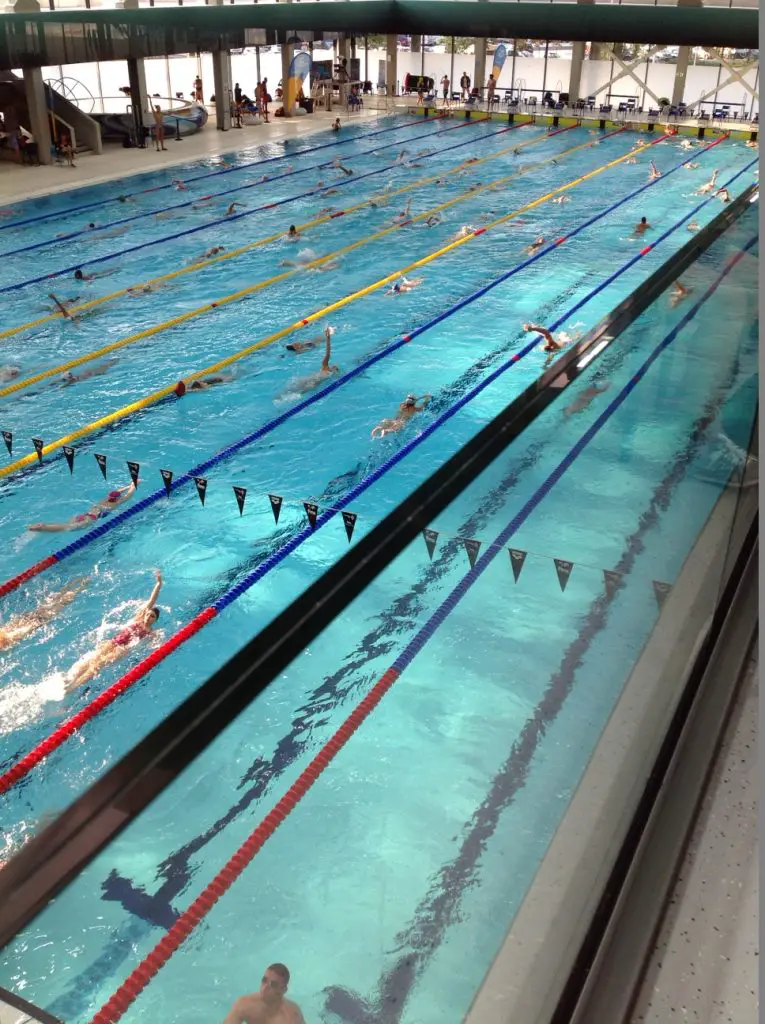First Swim Practice
No matter what age you are, starting something new is nerve-wracking. When you start swimming, you’ll probably find that your first day of swim practice can also make you anxious.
My first day walking onto the pool deck, I didn’t know what to expect. I didn’t know anyone or where I was supposed to go. But all around me, everyone else seemed to know what to do. And honestly? It was a bit disheartening.
The good news is that your first day of swim practice doesn’t have to feel like this! Because if you know what to expect or at least have an idea, it can make the world of a difference.
Related article: How to Prepare for Your First Swim Practice
While it’s by no means a complete list and can differ based on teams, it’s an honest report. 🙂 Here are 8 things you can expect on your first day of swim practice.
Disclosure: This post may contain affiliate links, meaning we earn a small commission at no cost to you if you purchase something through one of our links. As an Amazon Associate, we earn from qualifying purchases. Please check out our disclosure page for more information.

What To Expect
1. Confusion
Yes, it might seem strange to start with this, but I promised to always tell you the truth. And the truth is that your first day of swim practice, if not your first week, will be confusing.
And that’s okay! It’s to be expected, actually. 🙂
You’re new to not just the sport, but also the team. You have new phrases and expressions to learn, and new dynamics to understand. Things like this will take time and you will face a small learning curve.
Related articles:
The good news? Your coach and teammates understand this, as we’ve all been there once before!
Be patient with yourself and your teammates. To them, this is second nature and you might feel some frustration with how easy things come to them. Whether it’s a set or simply understanding what the coach is saying.
After a while, it will all come second nature to you. And it’ll come much faster than you think 🙂
2. Questions
Asking questions is the best way to overcome any confusion and frustration you might feel.
When in doubt, ask! Ask your coach what a certain drill or technique means. Have them explain something again if you’re not certain.
Trust me when I say that it’s your coaches job. So if it means you have to ask for clarification a few times within the first few weeks, do it!
If you’re not comfortable with that, then ask your teammates. Chances are, they know exactly what to do and are more than happy to help.
More Content for You: 7 Reasons to Wear Goggles When You Swim
Yes, you’ll have some teammates who can use some lessons in being a team player. If you come across one of those less than friendly individuals, then get your answers from someone else.
More often than not, you’ll have more people willing to help you than shut you down.
Also know that your first day of practice is time for your teammates to ask you questions!
It’s like the first day of school in a new place. Everyone wants to know a little about you. And that’s okay!
In turn, you get to ask questions of your own. Remember that learning about your team is a two-way street 🙂
3. New Terminology
Expect to hear some new terminology.
Much like any sport, swimming has its own set of words and phrases that only swimmers really understand. They can even confuse swim parents!
Related articles:
You’ll also see some new words or abbreviations when your coach writes the set on the board. Your coach should explain these to you. If not, remember that you can ask your coach and teammates questions 🙂
4. Swim Etiquette
Another thing you should expect on your first day of swim practice is swim etiquette. What is swim etiquette?
In short, swim etiquette is the proper way to swim in a pool.
We know, we know. It sounds funny to someone who doesn’t know the sport to think that there’s a ‘proper’ way to swim, strokes aside. But we cannot stress it enough.
Proper lane etiquette is what keeps everyone from swimming safely. It keeps swimmers from swimming every which way in the lane. And from crashing into each other, amongst other things.
Related Article: Swim Practice Etiquette
Know which direction the lane swims. We promise it’s the best way to ensure that you’re not running into anyone. Bumping heads in practice isn’t fun, especially if you’re sprinting. It’s a painful and startling experience when someone crashed into you.
Yes, I speak from experience and I’m sure most other swimmers can attest to this at least once. 🙂
5. Finding Your Place in the Pool
You can expect to have your coach move you around the pool during your first day of swim practice. It’s not for punishment or humiliation. Rather, it’s your coach trying to find the best fit for you on the team.
Most teams place swimmers of the same speed in the same lane.
It’s best to find a lane where your teammates can push and encourage you. Your coach knows this and will move you accordingly. Ideally, you’ll move lanes as you drop time and your times improve!
6. Finding Your Place in the Lane
Much like finding the right lane in the pool, you’ll need to find your place in the lane.
You can expect to play musical swimmers at your first swim team practice!
The fastest swimmer in the lane should lead, but not everyone trains as they race. This means that you could have a swimmer with faster times than you, but they’ll train slower in practice than you do.
Swimming is as much a physical sport as it is a mental one.
On your first day training with a new swim team, talk with your lane mates. They already know the order that works best for them. Your lane will figure out the best order and try it. If the order doesn’t work the first time, it’ll shuffle until it does.
It’s important to keep your patience during this time.

If someone is riding your feet, let them go in front of you next time. Don’t take offense if someone asks if they can go before you. It’s just as frustrating for you as it is for them.
More Content for You: What is Swimmer’s Ear?
On the other hand, if you’re riding someone’s feet, don’t be scared to ask if you can go before them. Chances are, they’re annoyed at you for playing taps on their feet and want you to go in front of them.
Be gracious about moving forward or back in the lane.
Remember, this is part of the learning process. And it’s how you grow and improve.
7. Learning Your Team’s Personality
We think this is the most challenging part of your day of swim practice.
While you might’ve watched the team train or spoken with the coach, it’s not the same as joining practice. Because not only does the team have a personality, but so too, does each lane.
Some lanes might act more serious. Others might joke around more, while another might be downright rude.
More Content for You: New Year’s Resolutions for Swimmers
Most teams have some inside jokes that you’ll need to learn as you go. Just remember that this isn’t something you can learn your first day of training with a new swim team. Be patient with yourself and engage with the rest of your team.
In doing so, you’ll learn the inside jokes and make a few of your own along the way!
8. Length of Practice
On average, you can expect swim practice to last at least an hour. This will vary based on team and what group you train with.
Typically, the younger swimmers will swim shorter practices. While the older swimmers will usually train for two hours and have two practices a day.
Prior to your first day of swim practice, make sure you check with your coach about the length of each practice. This will help you plan your day accordingly.
Related article: What Should You Bring to your First Swim Practice?
Additionally, you can expect that watching the clock like a hawk will only make practice go that much slower. Instead, learn to focus on only the seconds. Watching the minutes change will have your practice drag by.
In Closing
Your first day of swim practice can feel daunting. But with a little preparation, it doesn’t have to be! Remember that this is new for you and it’s okay if it takes you awhile to understand everything.
You can’t master everything on your first day!
And remember that you’re new for your team as well. Everyone will have to adjust as it applies to them.
Stay positive and ask questions when you’re not sure. It’s the best way to help acclimate yourself to your new team. And of course, have fun!
As always, happy swimming!
-Chevron
Bonus Content:
Swim Practice While Traveling: Missing swim practice due to traveling is to be expected at some point. Make your next away swim practice a success by following these tips and tricks.
What New Swimmers Should Know About Practice: Headed to your first swim practice but not sure what to expect? Here are six things new swimmers should know about swim practice.

Want to Improve at the Pool?
Join swimmers and swim parents to receive my free newsletter and receive a free Swimming Glossary e-book as a thanks!
Every month you’ll receive tips and coaching to help you find success at the pool.